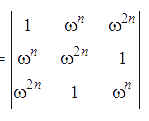If ω is the imaginary cube roots of unity, then the number of pair of integers (a,b) such that |aω+b|=1 is ______.
The correct Answer is:6
To solve the problem, we need to find the number of ordered pairs of integers (a,b) such that |aω+b|=1, where ω is a non-real cube root of unity.
1. Understanding the Cube Roots of Unity:
The cube roots of unity are the solutions to the equation x3=1. They are given by:
1,ω=e2πi/3=−12+i√32,ω2=e−2πi/3=−12−i√32
Here, ω3=1 and 1+ω+ω2=0.
2. Setting Up the Equation:
We start with the equation:
|aω+b|=1
Squaring both sides gives:
|aω+b|2=12
This implies:
(aω+b)(a¯¯¯ω+b)=1
Since ¯¯¯ω=ω2, we rewrite this as:
(aω+b)(aω2+b)=1
3. Expanding the Left Side:
Expanding the left-hand side:
a2(ω⋅ω2)+ab(ω+ω2)+b2=1
Since ω⋅ω2=1 and ω+ω2=−1, we have:
a2+ab(−1)+b2=1
Simplifying gives:
a2−ab+b2=1
4. Rearranging the Equation:
We can rearrange this equation as:
a2−ab+b2−1=0
5. Finding Integer Solutions:
We can treat this as a quadratic in a:
a2−ab+(b2−1)=0
The discriminant of this quadratic must be a perfect square for a to be an integer:
D=b2−4(b2−1)=−3b2+4
Setting D=k2 for some integer k:
4−3b2=k2⟹3b2+k2=4
6. Finding Integer Pairs:
We need to find integer pairs (b,k) such that 3b2+k2=4:
- If b=0, then k2=4⇒k=±2.
- If b=1, then 3+k2=4⇒k2=1⇒k=±1.
- If b=−1, it gives the same results as b=1.
- If b=2 or |b|>2, then 3b2>4, which is not possible.
The valid pairs are:
- For b=0: k=2 or −2 gives a2=1 leading to (1,0) and (−1,0).
- For b=1: k=1 or −1 gives a2=1 leading to (1,1) and (−1,1).
- For b=−1: similar to b=1 gives (1,−1) and (−1,−1).
7. Counting Ordered Pairs:
The pairs we found are:
- (1,0), (−1,0)
- (1,1), (−1,1)
- (1,−1), (−1,−1)
- (0,1), (0,−1)
- (1,0), (0,1)
Thus, the total number of ordered pairs (a,b) is 6.
Final Answer:
The number of pairs of integers (a,b) such that |aω+b|=1 is 6.
The cube roots of unity are the solutions to the equation x3=1. They are given by:
1,ω=e2πi/3=−12+i√32,ω2=e−2πi/3=−12−i√32
Here, ω3=1 and 1+ω+ω2=0.
We start with the equation:
|aω+b|=1
Squaring both sides gives:
|aω+b|2=12
This implies:
(aω+b)(a¯¯¯ω+b)=1
Since ¯¯¯ω=ω2, we rewrite this as:
(aω+b)(aω2+b)=1
Expanding the left-hand side:
a2(ω⋅ω2)+ab(ω+ω2)+b2=1
Since ω⋅ω2=1 and ω+ω2=−1, we have:
a2+ab(−1)+b2=1
Simplifying gives:
a2−ab+b2=1
We can rearrange this equation as:
a2−ab+b2−1=0
We can treat this as a quadratic in a:
a2−ab+(b2−1)=0
The discriminant of this quadratic must be a perfect square for a to be an integer:
D=b2−4(b2−1)=−3b2+4
Setting D=k2 for some integer k:
4−3b2=k2⟹3b2+k2=4
We need to find integer pairs (b,k) such that 3b2+k2=4:
- If b=0, then k2=4⇒k=±2.
- If b=1, then 3+k2=4⇒k2=1⇒k=±1.
- If b=−1, it gives the same results as b=1.
- If b=2 or |b|>2, then 3b2>4, which is not possible.
- For b=0: k=2 or −2 gives a2=1 leading to (1,0) and (−1,0).
- For b=1: k=1 or −1 gives a2=1 leading to (1,1) and (−1,1).
- For b=−1: similar to b=1 gives (1,−1) and (−1,−1).
The pairs we found are:
- (1,0), (−1,0)
- (1,1), (−1,1)
- (1,−1), (−1,−1)
- (0,1), (0,−1)
- (1,0), (0,1)
The number of pairs of integers (a,b) such that |aω+b|=1 is 6.
Topper's Solved these Questions
- BOOK - CENGAGE ENGLISHCHAPTER - COMPLEX NUMBERSEXERCISE - ARCHIVES (SINGLE CORRECT ANSWER TYPE )11videos
COMPLEX NUMBERS
- BOOK - CENGAGE ENGLISHCHAPTER - COMPLEX NUMBERSEXERCISE - MULTIPLE CORRECT ANSWER TYPE6videos
COMPLEX NUMBERS
- BOOK - CENGAGE ENGLISHCHAPTER - COMPLEX NUMBERSEXERCISE - LINKED COMPREHENSION TYPE36videos
COMPLEX NUMBERS
- BOOK - CENGAGE ENGLISHCHAPTER - CIRCLESEXERCISE - Comprehension Type8videos
CIRCLES
- BOOK - CENGAGE ENGLISHCHAPTER - CONIC SECTIONSEXERCISE - All Questions101videos
CONIC SECTIONS
Similar Questions
Knowledge Check
- Question 1 - Select One
If 1,ω,ω2 are cube roots of unity then the value of (5+2ω+5ω2)3 is
A27B−9C−27D−81
If ω is a cube root of unity, then
ω3= ……View SolutionIf ω is a cube root of unity, then
1+ω= …..View SolutionIf ω is an imaginary cube root of unity then the equation whose roots are 2ω+3ω2 and 2ω2+3ω is
View SolutionIf 1,ω,ω2 are the cube roots of unity, then △

is equal to.....View SolutionIf α, β, γ∈{1,ω,ω2} (where ω and ω2 are imaginery cube roots of unity), then number of triplets (α,β,γ) such that ∣∣∣aα+bβ+cγaβ+bγ+cα∣∣∣=1 is
View SolutionIf ω be an imaginary cube root of unity, show that 1+ωn+ω2n=0,for n=2,4
View SolutionIf ω is an imaginary cube root of unity, then show that (1−ω+ω2)5+(1+ω−ω2)5=32
View Solution

